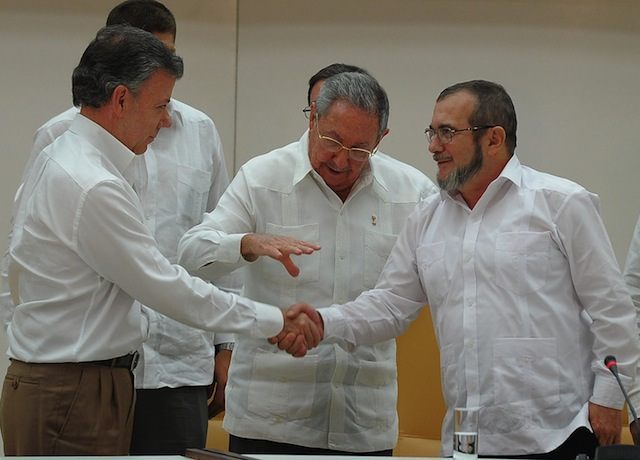As Colombians prepare to vote to approve or reject a peace deal with the FARC, the organization is gathering to discuss the potential of becoming a legalized political party, launching candidates as soon as the 2018 elections.
President Juan Manuel Santos has spent much of his political capital on arranging a peace deal with the Revolutionary Armed Forces of Colombia (FARC), the world’s wealthiest non-jihadist terrorist group, in an attempt to end half a century of Marxist violence.
Revolutionary Armed Forces of Colombia’s leaders, who have lived for years in Cuba with impunity, have recently arrived in Colombia to participate in the terrorist group’s tenth official “Guerrilla Conference,” among them the group’s leader, alias “Timochenko.”
Greeting Timochenko is a controversial billboard in the city of Santa Marta, warning Colombians of the potential political rise of the FARC. “Want to see Timochenko as president?” the billboard reads. “Vote ‘Yes’ on the peace deal.” The poster features the images of Fidel Castro and Hugo Chávez.
The conference will prioritize addressing the concerns of guerrillas regarding the peace deal, including what to do if Colombians vote against it. It will also address how to pivot the terrorist group’s infrastructure into legal political activity. In an interview with the Diario Las Americas, FARC leader Jorge Torres Victoria (“Pablo Catatumbo”) asserts that, of course, the FARC will nominate candidates for Congress in 2018.
Catatumbo, responding via email from Cuba, tells the newspaper that the terror organization is looking “to become a new political force, so of course we will nominate candidates.” He responds to the interviewer asking about political opponents referring to FARC leaders as “Castro-Chavistas” by dismissing the slur. “That accusation is never made against us – we have never denied our sympathies for the legacy of Fidel Castro’s and Hugo Chávez’s social programs – but against the government [for working with us].” The FARC political party, he confirms, would promote Cuba- and Venezuela-style communism.
The provisions of the Colombia-FARC peace deal, heralded by President Juan Manuel Santos as “an end to the longest and final armed conflict on the Western hemisphere” before the United Nations General Assembly last year, would allow Revolutionary Armed Forces of Colombia terrorists not found guilty of “crimes against humanity” to participate in the political process.
If passed by referendum, the peace deal would force all FARC members to hand over their weapons within an allotted time period and face a special tribunal for FARC crimes. The individual guerrillas would then either be found guilty of “political crimes” or “crimes against humanity,” with only the latter receiving prison sentences. Opponents of the deal argue that these two categories are too vague and will allow terrorist criminals to escape justice.
Catatumbo, meanwhile, alleges the tribunal will “not be against the FARC” but a “restorative justice mechanism” that may also try government officials and soldiers who “participated in the conflict.”
Those who do not serve prison time will be eligible to run for office. Many of these may be child soldiers or former child soldiers who have grown up within the FARC. While Catatumbo refuses to give the number of abducted minors currently still in FARC captivity, the Diario Las Americas reports the government estimates that number to be at least 170. The FARC released thirteen child soldiers into government custody over the weekend.
FARC soldiers interviewed about the peace deal seem largely positive towards the situation, and Catatumbo himself says optimism abounds among the terrorists. “This is a resurgence,” Mauricio, a FARC terrorist, told Univision in August. “This is about implementing a project to transform society.”
Opponents of the deal have expressed alarm at the idea of being governed by terrorist guerrillas, particularly ones with such deep pockets. “In an almost immediate future, the FARC, the wealthiest narco-terrorist group in the world, will be transformed before the aghast eyes of the Colombian people, into the richest political party in Colombia,” writes María Clara Ospina in the southern Colombian newspaper El Diario de Huila.
“They will have millions to spend on their campaigns, including to buy votes, a practice we all know is embarrassingly rooted in our country and pervasive,” she writes. Ospina adds that, as an official political party, FARC would have access to public election funds for campaigning, as well, to the tune of seven million pesos ($2,371.39).
Opposition Senator María del Rosario Guerra, speaking to Colombia’s El Tiempo, agrees, noting that the immediate consequence of the peace deal is “that the heads of the FARC – who have committed kidnappings, massacres, child rape, terrorist attacks – will not spend a single day in prison. And they can be elected to Congress.”

COMMENTS
Please let us know if you're having issues with commenting.